- Bone Health
- Immunology
- Hematology
- Respiratory
- Dermatology
- Diabetes
- Gastroenterology
- Neurology
- Oncology
- Ophthalmology
- Rare Disease
- Rheumatology
FDA Approves Biocon Biologics Ustekinumab Biosimilar, Yesintek
The approval marks the sixth biosimilar to reference Stelara (ustekinumab), and it will be used to treat several immunology conditions, including psoriatic arthritis and inflammatory bowel disease.
The FDA has approved Yesintek (ustekinumab-kfce), the sixth biosimilar to reference Stelara (ustekinumab) for the treatment of inflammatory bowel disease, plaque psoriasis, and psoriatic arthritis.1
Ustekinumab is a humanized immunoglobulin G1k (IgG1k) monoclonal antibody used to treat psoriatic arthritis, plaque psoriasis, and inflammatory bowel disease. IgG1k antibodies bind to the p40 protein subunit utilized by interleukin (IL)-12 and IL-23 cytokines. | Image credit: Steve Cukrov - stock.adobe.com

The biosimilar was developed by Karnataka, India–based Biocon Biologics and will likely launch in the second half of 2025, along with Otulfi (ustekinumab-aauz), Selarsdi (ustekinumab-aekn), Imuldosa (ustekinumab-srlf), and Pyzchiva (ustekinumab-ttwe). Wezlana (ustekinumab-auub), the first Stelara biosimilar to be approved, will launch in January 2025, per a settlement agreement with Johnson and Johnson (J&J), the maker of Stelara.2
The newest biosimilar is set to launch in the United States by February 22 at the latest, according to a settlement and licensing agreement reached earlier this year between J&J's subsidiary Janssen and Biocon Biologics.
Imuldosa was approved in October 2024,3 Otulfi was approved in September 2024, Pyzchiva was approved in July 2024, and Wezlana was approved in October 2023.4
According to the National Institute of Health, the US prevalence of PsA ranges from 6 per 100,000 to 25 per 100,000.5 Medscape estimates that between 1% to 2% of the US population has plaque psoriasis.6 Additionally, IBD affects 2.4 million to 3.1 million people in the US, with rising prevalence and health care costs, totaling $8.5 billion annually in 2018, according to the CDC.7
Biocon Biologics shared clinicals trial data on Yesintek at the European Academy of Dermatology and Venereology (EADV) 2024 Congress. The data concened a phase 3 randomized, double-blind, multicenter study evaluated the biosimilar against the reference biologic in 384 adult patients with moderate to severe chronic plaque psoriasis.8
Over 28 weeks, the primary efficacy endpoint, percentage change from baseline in Psoriasis Area and Severity Index, showed equivalence between Yesintek and Stelara. The study also confirmed comparable safety, immunogenicity, and pharmacokinetics profiles.
“This pivotal trial of [Yesintek] clearly met the safety and efficacy endpoints, thereby fulfilling the expectations set for a biosimilar. [Yesintek] offers tangible promise for all patients qualifying for treatment with Ustekinumab,” said Uwe Gudat, MD, chief medical officer, Biocon Biologics, in a statement about the trial.
References
1. U.S. FDA approves Biocon Biologics’ Yesintek™, Bmab 1200 biosimilar to J&J’s Stelara® (Ustekinumab). Press release. Biocon Biologics; December 1, 2024. Accessed December 2, 2024. https://www.bioconbiologics.com/u-s-fda-approves-biocon-biologics-yesintek-bmab-1200-biosimilar-to-jjs-stelara-ustekinumab/
2. Jeremias S. Amgen’s Stelara biosimilar delayed until 2025 after settling with J&J.The Center for Biosimilars®. May 29, 2024. Accessed December 2, 2024. https://www.centerforbiosimilars.com/view/amgen-s-stelara-biosimilar-delayed-until-2025-after-settling-with-j-j
3. Jeremias S. FDA Approves Imuldosa, a Biosimilar to Stelara. The Center for Biosimilars. October 11, 2024. Accessed December 2, 2024. https://www.centerforbiosimilars.com/view/fda-approves-imuldosa-a-biosimilar-to-stelara
4. Biosimilar approvals. The Center for Biosimilars. Updated December 2, 2024. Accessed December 2, 2024. https://www.centerforbiosimilars.com/view/fda-approves-imuldosa-a-biosimilar-to-stelara
5. Karmacharya P, Crowson CS, Bekele D, et al. The epidemiology of psoriatic arthritis over 5 decades: a population-based study. Arthritis Rheumatol. 2022;73(10):1878-1885. doi:10.1002/art.41741
6. Lui H, Mamelak AJ. Plaque psoriasis. Medscape. Updated December 21, 2023. Accessed December 2, 2024. https://emedicine.medscape.com/article/1108072-overview#:~:text=Plaque%20psoriasis%20occurs%20worldwide%2C%20although,the%20population%20has%20plaque%20psoriasis
7. IBD facts and stats. CDC. June 21, 2024. Accessed December 2, 2024. https://www.cdc.gov/inflammatory-bowel-disease/php/facts-stats/index.html
8. Biocon Biologics announces new dermatology data to be presented at EADV Congress 2024. September 25, 2024. Accessed December 2, 2024. https://www.biocon.com/biocon-biologics-announces-new-dermatology-data-to-be-presented-at-eadv-congress-2024/
Newsletter
Where clinical, regulatory, and economic perspectives converge—sign up for Center for Biosimilars® emails to get expert insights on emerging treatment paradigms, biosimilar policy, and real-world outcomes that shape patient care.
